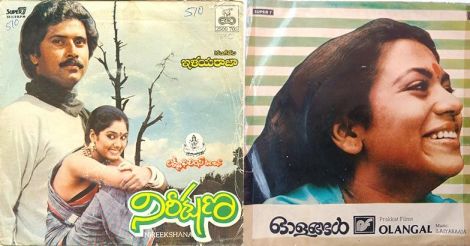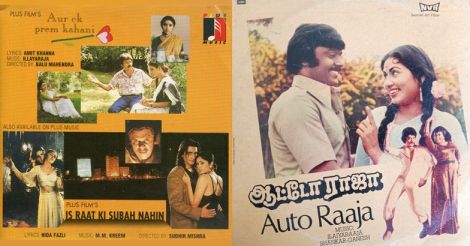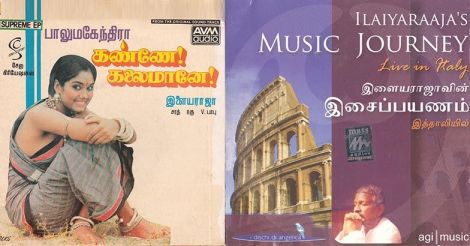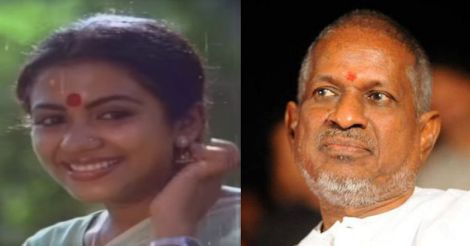There are seven notes in music, seven colours, seven heavens, seven seas, and seven days in a week. ‘Seven’ rules the world. Any music can be created with the seven notes. Musicians accused of plagiarism often find it convenient to shift the blame to these seven notes.
In such a situation, what would you call a music director creating several songs in many languages in the same tune? A pure copycat! Film composers like Salil Chowdhury, Bombay Ravi, Ilayaraja, Vidyasagar and A R Rahman have all repeated their tunes in many languages, but nobody has 'plagiarised' his own song seven times, except Ilayaraja. The song that earned Ilayaraja this 'honour' is ‘Thumbi vaa… thumbakudathinu’ which is still hummed by Malayalees.
The first ‘avatar’ of the song was in Malayalam itself, in Balu Mahendra’s ‘Olangal’ released on January 25, 1982. The lyrics were written by ONV and the song in S Janaki’s voice melted into the hearts of Malayalees. Picturised on Amol Palekar and Poornima Jayaram with children, the visuals were also striking.

‘Thumbi vaa’ saw its first ‘rebirth’ in Tamil in 1982 itself, when the movie ‘Auto Raja’ directed by K Vijayan was released. It was a remake of a Kannada film of the same name. Though the music directors of the film were Sankar–Ganesh, the ‘Thumbi’ was composed by Ilayaraja. When Tamil Nadu heard the song, it was in Ilayaraja’s as well as Janaki’s voice. ‘Thumbi’ in no time became a much-loved romantic number in Tamil.

In 1986, ‘Thumbi’ was heard in Telugu, in ‘Nireekshana’. It was a remake of Balu Mahendra’s Malayalam movie ‘Yatra’. All hit songs in ‘Yatra’ were set to tune in Telugu also, but two more numbers were added – one was ‘Thumbi’. It was S Janaki again who lent her voice. ‘Nireekshana’ was remade as ‘Kanne Kalaimane’ in Tamil. ‘Thumbi’ was yet again a Tamil song sung by S Janaki. It was very popular also.
Several years later, the song witnessed its next ‘avatar’. This time, in Hindi. Balu Mahendra released his ‘Aur Ek Prem Kahani’ in 1996 which was an adaptation of his first directorial venture ‘Kokila’, a Kannada film. This film had a Malayalam version too – ‘Oomakkuyil’ released in 1983. Salil Chowdhury composed the music for ‘Kokila’, but Ilayaraja gave the tunes for the songs in ‘Aur Ek Prem Kahani’ and ‘Oomakkuyil’. However, the Hindi version in the voice of Mano and Preethi Utham Singh did not meet the standards of the other versions. Nevertheless, the debut of ‘Thumbi’ in Hindi was a landmark.

The next ‘avatar’ of ‘Thumbi’ was on the global stage. After capturing the hearts of music lovers in various Indian languages, ‘Thumbi’ was presented as a vocal-cum-orchestra symphony by Ilayaraja at a live show in Italy in 2004. The composition was titled ‘Mood Kaapi’ and was greeted with a long applause by the audience.
The story does not end there. ‘Thumbi’ made its seventh appearance which was among the most popular versions to have come out. The film was ‘Paa’, in which Amitabh Bachchan produced one of his scintillating performances. In the movie, directed by R Balki, the song was sung by Sravan and Ilayaraja’s daughter Bhavatharani. ‘Thumbi’, which had to face much flak during its first appearance in Hindi, more than made up for the damage and became a huge hit.

Though it has been repeatedly heard in several languages, one cannot predict whether the tune would appear again in yet another film. Its music is timeless. Music lovers have no clue regarding the reason that made Ilayaraja repeat the tune several times over. Maybe he loves it so much or maybe fans of that song persisted on the composer to make ‘Thumbi’ heard again and again. However, nobody has any doubt that ‘Thumbi’ – which was born out of the genius of Ilayaraja – once heard, will never fade away from the listener’s mind. It will still remain fresh, no matter how many times you hear the song.

























 Music lovers have no clue to why Ilayaraja repeated the tune several times over.
Music lovers have no clue to why Ilayaraja repeated the tune several times over.